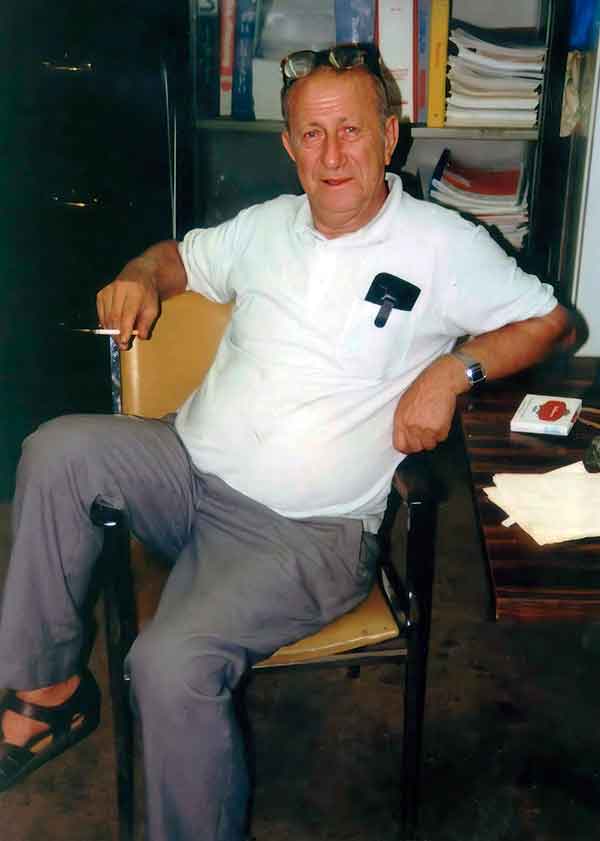
April 2024
Moishe Chaimovitz
My father, Yom Tov Lipa Chaimovitz was born on Oct. 4, 1922 in a small shtetl called Izza in Czechoslovakia. He grew up in a religious family with four brothers and two sisters, his family enjoying a quiet existence in a Jewish neighbourhood. Their lives were turned inside out when the Nazis invaded Europe and took his family.
My father managed to escape into the forest and became a partisan, surviving through determination, using his knowledge of multiple languages to help him in various situations. He spent the war in Czechoslovakia, Hungary and Poland, going from place to place to avoid being caught. In many places he saw dead bodies and on more than one occasion, he would lie among them to avoid being captured. His stories were filled with details about frightening situations, and it is unfathomable to think about what he went through.
In 1945, hearing that the Russian army was heading towards Theresienstadt, my father decided to turn himself in. He was remained determined to stay alive and help his fellow prisoners. In Theresienstadt, he miraculously found his brother, Yechiel, who appeared close to death. My father tended to him, and when the American army marched into Theresienstadt he approached an officer to ask for help. When the soldier took off his cap, my father saw he was wearing a yarmulka and felt an immediate sense of relief. The officer was able to get help and Yechiel survived.
Once liberated, my father and his brother set out to search for other family members. Unfortunately, they didn’t find anyone, but my father did find Esther Moskovitz, a woman he had known before the war. Together, they went to Austria to search for her family, where she found her brother Joshua.
Lipa and Esther, now a couple, were trying to decide what would be their next step. Lipa wanted to go to Israel and Joshua wanted to go to Canada. Esther chose to stay with Lipa, and soon after, the couple boarded a ship bound for what was then British Mandate Palestine. Unfortunately, their ship was turned away to Cyprus, where my parents spent the next six months facing life-threatening conditions in a British-run concentration camp. In 1946, they finally disembarked near the village of Atlit, helped by Haganah fighters. Finally home in the holy land, my parents were happy, but their feelings of relief didn’t last long. They didn’t know the language, had no money, nor profession. They settled in a shack in a town near Rehovot, where Lipa worked in an orchard for an English penny a day. Life was hard.
I was born in March 1947, the first “Sabra” of the family. Not long after, Israel was declared a state and my father volunteered and fought in the War of Independence. He was among the group of soldiers who opened a route to Jerusalem, singularly devoted to his family and to his country.
Lipa and Esther moved to Moshav Beit Elazarei in 1950, where they had a small farm, raised cattle and chickens and grew everything they needed. The army was still a priority and a source of pride for my father. In 1956, at the height of the Suez Canal crisis, his group of artillery fighters fought their way through the desert to the shores of the canal.
As a young boy, it was hard to have my father be away for long periods of time, sometimes for up to four weeks, but I knew that he did it for me, our family and our country. I used to wait for his bus to come home, for him to get off and come to us. When he finally did arrive, I remember asking him why he was gone longer than others, and his response was, “the army needed me.” At that moment, I knew he was my hero and a silent hero for so many others.
In 1960, Lipa and Esther decided to join her brother Sam Moskovitz in Hamilton. Paperwork and medical were completed in early 1961 and we were on our way to Canada. It was a sad and tearful night on the back deck of the steam liner SS Atlantic as we watched the lights of Haifa disappear from view.
We arrived at Ellis Island 14 days later, transferred to Grand Central Station and continued by train to Fort Erie where my uncle picked us up and took us to his house. I was 14. My brothers Mike, Carl and Jerry were 11, eight and five. In Canada, we made a new life.

Yom Tov Lipa Chaimovitz in 1991

